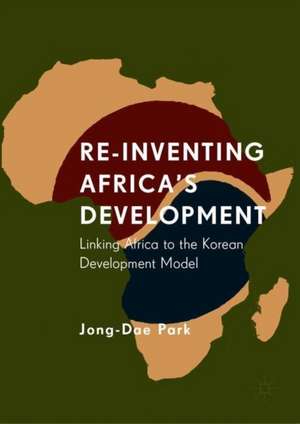Re-Inventing Africa's Development: Linking Africa to the Korean Development Model
Autor Jong-Dae Parken Limba Engleză Hardback – 12 ian 2019
This open access book analyses the development problems of sub-Sahara Africa (SSA) from the eyes of a Korean diplomat with knowledge of the economic growth Korea has experienced in recent decades. The author argues that Africa's development challenges are not due to a lack of resources but a lack of management, presenting an alternative to the traditional view that Africa's problems are caused by a lack of leadership. In exploring an approach based on mind-set and nation-building, rather than unity – which tends to promote individual or party interests rather than the broader country or national interests – the author suggests new solutions for SSA's economic growth, inspired by Korea's successful economic growth model much of which is focused on industrialisation.
This book will be of interest to researchers, policymakers, NGOs and governmental bodies in economics, development and politics studying Africa's economic development, and Korea's economic growth model.
Preț: 155.66 lei
Nou
Puncte Express: 233
Preț estimativ în valută:
29.78€ • 31.18$ • 24.65£
29.78€ • 31.18$ • 24.65£
Carte disponibilă
Livrare economică 15-29 martie
Livrare express 01-07 martie pentru 47.54 lei
Preluare comenzi: 021 569.72.76
Specificații
ISBN-13: 9783030039455
ISBN-10: 3030039455
Pagini: 474
Ilustrații: XXI, 449 p. 23 illus., 3 illus. in color.
Dimensiuni: 148 x 210 x 36 mm
Greutate: 0.91 kg
Ediția:1st ed. 2019
Editura: Springer International Publishing
Colecția Palgrave Macmillan
Locul publicării:Cham, Switzerland
ISBN-10: 3030039455
Pagini: 474
Ilustrații: XXI, 449 p. 23 illus., 3 illus. in color.
Dimensiuni: 148 x 210 x 36 mm
Greutate: 0.91 kg
Ediția:1st ed. 2019
Editura: Springer International Publishing
Colecția Palgrave Macmillan
Locul publicării:Cham, Switzerland
Cuprins
Part 1: The Paradox of Sub-Saharan Africa.- 1. Disillusionment and Dilemma.- 2. Assessing the Role of Foreign Aid, Donors and Recipients.- Part 2: Rethinking the Root Causes of Africa's Under-Development.- 3. Review of Conventional Explanations.- 4. Uncovering the Main Root Cause: The Mindset Factor.- Part 3: Africa’s Incomplete Nation-Building: What is Missing?.- 5. Finding the Missing Links.- 6. Reasons for Optimism and the Tasks at Hand.- Part 4: Understanding Korean Development Model and Policies.- 7. Korea's Path of Development in Retrospect.- 8. The Essence of the Korean Model of Development.- Part 5: Implications of the Korean Development Model for Africa.- 9. Applicability of the Korean Model of Development for Africa.- 10. Policy Recommendations for Africa.- 11. Engineering Rural Development for Africa.- Part 6: Re-Inventing Africa’s Development from the Lessons Learned.- 12. Re-Setting the Priorities.- 13. Enacting a Bold but Harmonious Change.
Recenzii
“The work is geared towards a general readership interested in Korea’s development process and African politics in relation to the obstacles to development.” (Joonhwa Cho, Pacific Affairs, Vol. 93 (1), 2020)
Notă biografică
Jong-Dae Park is the South Korean Ambassador in South Africa and a specialist in African Development and Korea’s soft power. Park, a career diplomat, has been heavily engaged in development assistance for the last seven years when he was the Ambassador in Uganda. He also held the position of Director of Policy Planning in the Foreign Ministry, and served in the Presidential Office. He holds a BA from Yonsei University, Korea, an MA from UC Berkeley, USA, and a Ph.D. from Kyungnam University, Korea. Park has an extensive network with government leaders and elites, the academia, the international development community, business circles, the media, and volunteers and NGOs both in Africa and internationally.
Textul de pe ultima copertă
This open access book analyses the development problems of sub-Sahara Africa (SSA) from the eyes of a Korean diplomat with knowledge of the economic growth Korea has experienced in recent decades. The author argues that Africa's development challenges are not due to a lack of resources but a lack of management, presenting an alternative to the traditional view that Africa's problems are caused by a lack of leadership. In exploring an approach based on mind-set and nation-building, rather than unity - which tends to promote individual or party interests rather than the broader country or national interests - the author suggests new solutions for SSA's economic growth, inspired by Korea's successful economic growth model much of which is focused on industrialisation.
This book will be of interest to researchers, policymakers, NGOs and governmental bodies in economics, development and politics studying Africa's economic development, and Korea's economic growth model.
Caracteristici
First-ever “mind-set change” approach proposed for sub-Saharan Africa’s development. Introduces a comprehensive “Korean development model” combining both economic aspects and social-political aspects as applicable to Africa. Presents a new formula for Africa’s transformation based on the “golden rules of development”.
